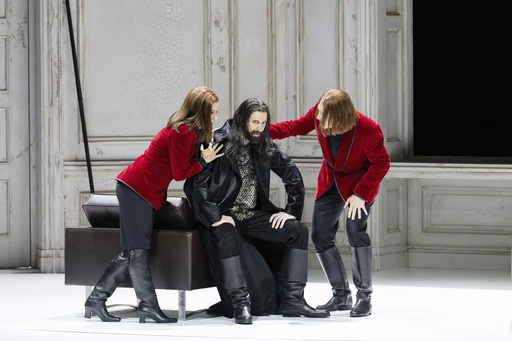
NEW YORK — David Leigh’s performance of “The Impossible Dream” during his father’s funeral served as both a tribute to his family’s legacy and a glimpse into his burgeoning future. Leigh, who has pursued a career as an operatic bass, is the son of Mitch Leigh, the composer behind the iconic musical “Man of La Mancha,” a hallmark of Broadway from the 1960s, long before David’s arrival.
Mitch Leigh passed away in 2014 at the age of 86 while David was immersed in his voice studies in Yale’s graduate program, grappling with the early stages of his career. “My dad was eager to witness my success firsthand,” Leigh recalled, expressing his father’s anticipation for his son’s budding talent.
Though Mitch did not live to see his son thrive, at 36, David is carving a pathway to achieving his dreams in opera. This month, he will portray the significant role of the jailer Rocco in a new staging of Beethoven’s sole opera, “Fidelio,” at the Washington National Opera, set to premiere this Friday.
Francesca Zambello, the artistic director of Washington National Opera, expressed strong faith in Leigh’s abilities, stating, “He’s going to be the real deal. A bass as young as he is, possessing such a commanding voice, is exceptionally rare.”
Last year, Andreas Homoki, the former artistic director of the Zurich Opera, remembered searching for a unique talent rather than an established performer for the role of the villain Hagen in Wagner’s “Ring” cycle. His choice of Leigh was met with satisfaction. “Besides his impressively powerful voice and striking physical presence—he stands tall at 6-foot-5—he conveys a unique sense of vulnerability,” Homoki shared, praising Leigh’s promise in the opera world. Recognizing Leigh’s relative youth compared to other performers, he noted that it’s difficult to envision him not experiencing global success in the coming years.
Gianandrea Noseda, the music director of the Zurich Opera who conducted the performances of the “Ring,” remarked on the noble quality and finesse Leigh brought to his role. Interestingly, while 36 is not considered particularly young in many professions, the development of operatic voices, particularly for basses, typically requires years of maturation. “There’s a prolonged process of refinement,” Zambello noted.
In the earlier stages of his career, Leigh faced challenges partly due to his age. Many prominent bass roles are suited for older characters, and he often encountered comments during auditions about his youth. “People would ask my age, and when I shared it, they’d remark that I’d sing those roles when I got older,” he said. “I was actually quite excited when I began to get some gray hairs in my beard,” he joked.
Nevertheless, the longevity of a bass’s singing career can be remarkable, with many continuing to perform well into their 60s or beyond. Leigh referenced the legendary Soviet bass Mark Reizen, who famously performed at the age of 90.
Although Leigh naturally possessed a notably low vocal range, he reflected on his early days at Mannes College of Music in New York, stating, “I was somewhat lost in technique and skill when I began.” Joshua Greene, one of his mentors at Mannes, observed that Leigh arrived with potential yet lacked refinement. “The low notes were exceptional, yet it was uncertain what his capabilities were beyond that. Watching David develop has been thrilling over the years we’ve worked together,” Greene commented.
Now, Leigh boasts an impressive vocal range spanning nearly three octaves, from G above middle C down to A beneath low C. Among his aspirational roles, he lists Gurnemanz from Wagner’s “Parsifal” as his top choice, a role he was slated to perform with the Canadian Opera Company during the pandemic-canceled 2020-21 season. “The music is indescribably beautiful, falling within a range where I can truly express myself,” he expressed, noting that he can convey nuanced emotions through each phrase.
Other desired roles include King Philip in Verdi’s “Don Carlo” and various significant Russian parts, like the title role in Mussorgsky’s “Boris Godunov.” As for “The Impossible Dream,” the signature piece from “Man of La Mancha,” Leigh was initially hesitant to perform it while his father was alive, feeling it might come off as favoritism. That sentiment shifted during the funeral, and now he embraces the song, performing it as an encore after his recitals. “It was an overwhelming moment,” Leigh shared. “Singing it became a beautiful experience for me.”
